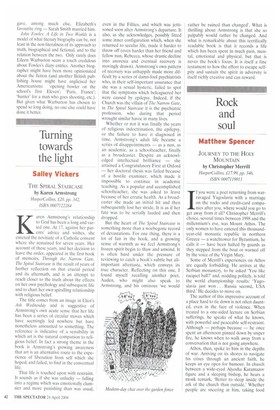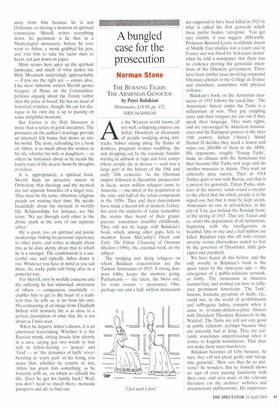Rock and soul
Matthew Spencer
JOURNEY TO THE HOLY MOUNTAIN by Christopher Merrill HarperCollins, £17.99, pp. 346, ISBN 0007119011 1 f you were a poet returning from warravaged Yugoslavia with a marriage on the rocks and credit-card companies after you, where would you go to get away from it all? Christopher Merrill's choice, several times between 1998 and the millennium's eve, was Mount Athos. The only women to have entered this thousandyear-old monastic republic in northern Greece — a watchtower for Byzantium, he calls it — have been halted by guards as they stepped from the boat or warned off by the voice of the Virgin Mary. Some of Merrill's experiences on Athos are equally forbidding. He arrives at the Serbian monastery, to be asked 'You like racquet ball?' and, nodding politely, is told the world championship results: 'Yugoslavia just won . . . Russia second, USA third.' He decides to move on. The author of this impressive account of a place hard to tie down is not often daunted, even in the face of violence. When treated to a one-sided lecture on Serbian sufferings, he speaks of what he knows, with powerful and peaceable self-restraint. Although — perhaps because — he once spent an afternoon pinned down by sniper fire, he knows when to walk away from a conversation that is not going anywhere. Athos, then, spoke to him in the depths of war. Arriving on its shores to navigate his crises through an ancient faith, he keeps an eye open for humour. In church between a wide-eyed Alyosha Karamazov figure and a sleeping bishop, he hears a monk remark, 'Better to sleep inside the ark of the church than outside.' Whether people are sneering at him, taking food
away from him because he is not Orthodox, or sharing a moment of spiritual connection, Merrill writes everything down. So persistent is he that in a Montenegrin monastery, before he ever went to Athos, a monk grabbed his pen, and told him to take his racist slurs to heart, not just down on paper.
Many scenes here spice up the spiritual landscape, and much of what makes the Holy Mountain surprisingly approachable — if you are the right sex — comes alive. Like most Athonite writers Merrill quotes Gregory of Nyssa on the Constantinopolitans arguing about the Trinity rather than the price of bread. He has no need of historical crutches, though: his ear for dialogue in his own day is up to passing on some delightful moments.
But Journey to the Holy Mountain is more than a series of good anecdotes. The pressures on the author's marriage provide an intensely felt frame that draws us into his world. The story, refreshing for a book on Athos, is as much about the women in his life, whether his wife or daughters — or others he fantasises about as he treads the lonely ways of the desert, beset by thoughts of wolves.
It is. appropriately, a spiritual book. Merrill finds an attractive notion in Orthodoxy that theology and the mystical are not separate branches of a larger tree. They must be the same, otherwise religious people are wasting their time. He speaks beautifully about the mystical in worldly life. Relationships, for instance, are like icons: 'We see through each other to the divine spark at the core of our separate selves.'
He is good, too, on spiritual and poetic awakenings, linking his personal experience to other poets, and writes as deeply about this as he does alertly about that to which he is a stranger. The combination is a successful one, and typically Athos draws it out. Whatever you have in mind as you sail there, the rocky paths will bring alive in a powerful way.
For Merrill, torn by worldly concerns and the suffering he has witnessed, awareness of others — compassion, essentially — enables him to get to the heart of a tradition that, he tells us, is far from his own. His contrasting of an image from Elizabeth Bishop with monastic life is as close to a perfect description of what that life is not about as I have seen.
When he departs Athos's shores, it is an emotional leavetaking. Whether it is the Russian monk, sitting beside him silently in a cave, saying just two words to him rich in fellow-feeling — 'prayer' and 'God' — or 'the dynamics of faith' reverberating in 'every part' of his being, you sense that, whether he returns or not, Athos has given him something, as he honestly tells us, on which to rebuild his life. Does he get his family back? Well, you don't need to travel there, monastic passports and all, to find out.



















































































 Previous page
Previous page